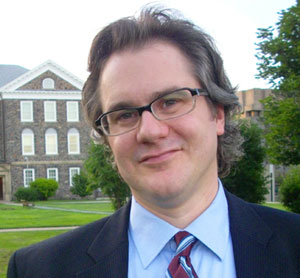 |
| Brian Bow is a professor with ±«Óătv's Department of Political Science. |
If Canada and the United States had Facebook profiles, under “relationship” it would likely read “it's complicated.” For his book studying the relationship between the two countries, ±«Óătv professor Brian Bow has been awarded the 2009/2010 Donner Prize for the best book on Canadian public policy. The award carries with it a $35,000 prize.
The book, The Politics of Linkage: Power, Interdependence and Ideas in Canada-U.S. Relations, argues there was a genuinely “special relationship” between both countries in the 1950s and ’60s and that policy-makers in both countries had a set of “rules” for bilateral bargaining that strengthened Canada's negotiating position. However, while still cooperative today, the relationship is no longer “special” as it once was.
“After the early 1970s, control over foreign policy-making in the U.S. became much more fragmented, and that meant that the Americans were no longer able to follow the old post-war bargaining norms,” explains Dr. Bow, professor in the Department of Political Science. “The U.S. still exercises restraint in its dealings with Canada, but that restraint is predicated on costs associated with interdependence, not on a sense of moral obligation or shared understanding.”
As for the present, Dr. Bow believes relations are neither great nor poor.
'Buy American'
“The Harper government has made an effort to keep things running smoothly, and has managed to avoid serious trouble on Afghanistan, 'Buy American', and other issues, but it hasn't really built up close ties with the Obama administration,” he says. The main reason for this, he explains, is that the Conservatives seem more concerned with survival as a minority government and the recession instead of being ambitious and proactive.
Fundamentally, he doesn't expect the bilateral relationship to change much through the next decade or so, mostly due to Canada's strategic and economic dependence on the U.S. He believes Canada—and most of the Western Hemisphere—are way down on Obama's list of priorities now, and likely to stay there.
“The main thing I expect to see over the next little while is a series of choices made in Washington about national or global policy challenges – (such as) energy, environment, immigration – which will have unintended consequences for Canada, and the two governments will have to get together to figure out how to cope with those changes, after the fact,” he says. “In most cases, Canada will have to adapt to what the U.S. does, but there will also be some opportunities for us to work out compromises or special side deals, if only we are sufficiently engaged, creative, and persistent.”
Fulbright professor
Currently, Dr. Bow is the Fulbright Visiting Research Chair at the Woodrow Wilson International Center for Scholars in Washington D.C. He says it's an excellent opportunity to focus on research and writing, and renew and expand his contacts. He is working on a new book, moving beyond the bilateral Canada-U.S. relationship to the “Canada-US-Mexico triangle” and the process of regional integration built around NAFTA.
The Donner Prize was established in 1998 to reward “excellence and innovation in Canadian public policy thinking, writing and research.”
“It's a tremendous honour,” says Dr. Bow of the award. “The Donner Prize is not just about quality scholarship, but more particularly for scholarship which engages with important real-world policy problems in a way that is accessible not only to academic experts and policy-makers, but to a broader audience.”
